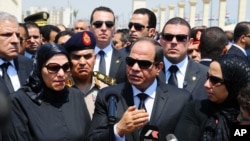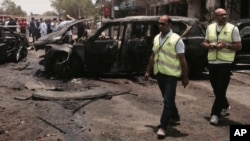Egyptian President Abdel-Fattah el-Sissi on Tuesday pledged to change laws “within days” to bring swift justice following a car bombing that killed the country's chief prosecutor, the first assassination of a top Egyptian official in a quarter century.
Sissi said he would free the judiciary's hand in a “battle,” adding that the country is ready for it. He spoke at the funeral for Hisham Barakat, the top judicial official overseeing the prosecution of thousands of Islamists, including the former president, Mohammed Morsi.
“The judiciary is restricted by laws, and swift justice is also restricted by laws. We will not wait for that,” Sissi said. “We will amend the laws to enable us to execute the law, and bring justice as soon as possible.”
Sissi led the procession, with hundreds of state officials and military men walking in unison as wreaths were laid for what the media unanimously described as the death of a “hero” and “martyr.”
Television programs suspended all other broadcasts until 7 p.m. to show footage of the funeral, images of Monday's bombing and its aftermath, and religious blessings for Barakat.
Security was boosted across the capital ahead of the funeral, with armored personnel carriers positioned across town from early in the day and additional checkpoints set up.
Authorities had declared June 30 - the second anniversary of mass street protests that led to the ouster of Morsi, Sissi's predecessor, by the military - a national holiday, but also cancelled all official celebrations in a sign of mourning for Barakat.
The funeral was held at the Tantawi Mosque - a newly built house of worship dedicated to the retired field marshal who ran Egypt under a military council in the year between the ouster of longtime autocrat Hosni Mubarak in 2011 and Morsi's election. Newspapers ran front page photos of Barakat's motorcade in flames.
Brotherhood blamed
Authorities and pro-government TV networks had quickly blamed Morsi's Muslim Brotherhood, which they consider a terrorist group, for the assignation, broadly accusing it of orchestrating violence.
Since Morsi's overthrow, they have launched a crackdown on the group, and other Islamists killing hundreds, detaining tens of thousands, and handing out mass death sentences against them in trials harshly criticized as lacking due process.
In a thinly veiled reference to the group, Sissi blamed the violence on those “issuing orders from behind bars,” and said Egypt was ready to brush international criticisms aside, and stand up to the world.
“You don't know the grip of the state,” he said, adding that “if there is a death sentence, it will be carried out... If there is a life sentence, it will be carried out.”
Following Morsi's overthrow in 2013 by then-army chief Sissi, a long running insurgency by Islamic militants in the Sinai Peninsula surged dramatically, with regular attacks on police and military forces killing hundreds. Attacks also targeted army and police forces elsewhere across the country, and one main extremist group has pledged allegiance to the Islamic State group and says it wants to expand elsewhere in Egypt.
Violence continued even as Egypt prepared for Barakat's funeral. In the northern Sinai city of Sheikh Zuweyid, a mortar shell allegedly fired by extremists at an army position fell on a private residence, killing two children and wounding three others, family members said. And in the city of Beni Suef along the Nile River south of Cairo, security officials said gunmen opened fire on a police car, killing a sergeant and wounding four others.
The family members spoke on condition of anonymity for fear of repercussions, while the security officials did the same because they were not authorized to brief journalists.





